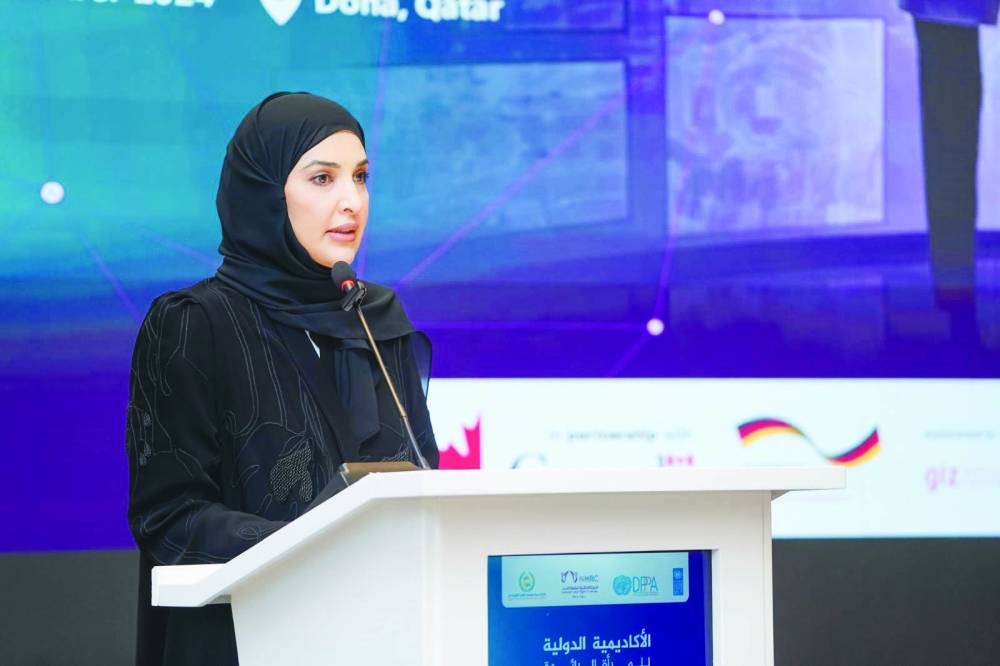The second session of the International Academy for Women Leaders, under the theme: “Leadership in the Digital Era”, kicked off in Doha Sunday with a high-level local, regional, and global attendance.
The event is jointly organised by the National Human Rights Committee (NHRC), the Arab Network for National Human Rights Institutions (ANNHRIs), the UN Development Programme (UNDP), and the UN Department of Political and Peacebuilding Affairs.
In her opening remarks, HE the Chairperson of NHRC Maryam bint Abdullah al-Attiyah, who is also the Chairperson of ANNHRIs, affirmed that achieving the Sustainable Development Goals (SDGs) is closely intertwined with the empowerment of women and girls digitally, adding that reaching a more sustainable and equitable world requires ensuring the active engagement of women in policy-making and decision-making processes.
She highlighted that there is a clear nexus between the empowerment and leadership of women in the digital age and the implementation of the Security Council Resolution 1325 and other related resolutions, noting that the role of women in conflict prevention, peace-building, and their engagement in relief, recovery, and reconstruction efforts has become a critical and foremost issue, given the devastating wars that are engulfing the world, where women are paying a heavy price. She underlined those armed conflicts, in general, exacerbate the marginalisation of women in all areas, emphasising the importance of countries’ unwavering commitment today to promoting women and girls’ access to digital technology and enabling them to benefit from it in areas such as strengthening leadership capacities, accessing information, and creating platforms for interaction, networking, and exchanging experiences among themselves.
HE al-Attiyah highlighted that there is a need to protect women and girls from all forms of digital violence and from stereotyping and biases on digital platforms, underscoring the multiple roles played by national human rights institutions (NHRIs), particularly through their monitoring of legislation and various related measures and practices, providing their perspectives on these issues, and conducting productive dialogues among all stakeholders and official bodies on emerging human rights matters.
For her part, HE the Deputy Speaker of the Shura Council Dr Hamda bint Hassan al-Sulaiti hailed the NHRC’s efforts and initiative, alongside its partners, describing it as leading in organising the session, adding that such an initiative aims to achieve peace and development by fostering women’s engagement in decision-making processes.
Dr al-Sulaiti affirmed that there is no doubt that Qatar’s selection to launch this event internationally is a testament to the world’s trust in Qatar, as well as the region, and the Arab world, thereby underscoring Qatar’s commitment to achieving international peace and security, while also demonstrating the country’s dedication to supporting women and enhancing their role in various developmental fields.
She emphasised the importance of women’s engagement in decision-making processes to shape a better future for the world, and for the region in particular, calling for more partnerships between various institutions to launch academic initiatives and implement diverse training programmes to enhance the capabilities and potential of women and girls in decision-making processes.
Additionally, Dr al-Sulaiti noted the marginalisation and discrimination that women face despite their role in any society, highlighting that women face myriad challenges that squarely undermine their ambitions and hinder their ability to contribute to development fields, in addition to the heavy burden they bear in wars, conflict zones, and disaster-stricken areas.
The Secretary-General of ANNHRIs Sultan bin Hassan al-Jamali underscored the duty of national institutions to bolster the role of women and their rights through awareness, education, training, reviewing laws and policies, and proposing amendments. This includes adopting laws and policies that promote women’s rights and ensure their fair representation in political institutions, as well as monitoring and opposing hate speech and stereotypes they face.
UN Assistant Secretary-General for Africa Martha Pobee said the rapid technological advancements in recent years have created opportunities and challenges to foster the overall democratic processes, in addition to addressing the digital divide both within and among nations, highlighting that if this gap is not properly addressed, new technological advancements could perpetuate and amplify inequality, discrimination, misinformation, and violence against women.
For her part, representative of the German Agency for International Co-operation (GIZ), Shatha Alawneh, affirmed that women in many parts of the world, including Arab countries, face daunting challenges and discrimination, especially in adapting to the digital age and thriving within it, highlighting that these challenges range from barriers to accessing digital knowledge to issues of protection in the digital space.
Dr al-Sulaiti cited the wanton aggression led by the Israeli occupation army against the Gaza Strip and the other occupied Palestinian territories, which has been extended since last September to include Lebanon. She emphasised that the Israeli occupation army continues to disregard the international community and persists in perpetrating genocide, ethnic cleansing, and forced displacement against the Palestinian people, despite repeated calls from the international community to take responsibility and put an end to this barbaric war.

